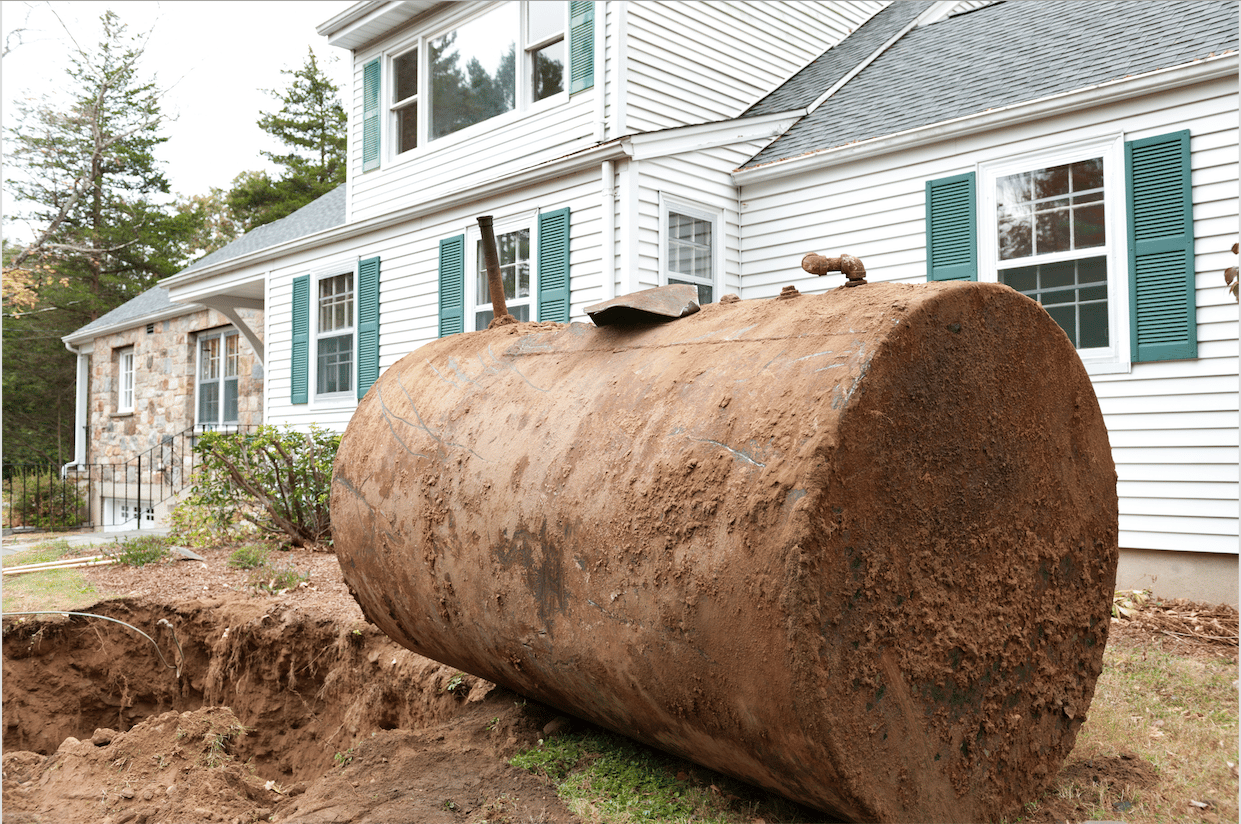How Much Does it Cost to Decommission an Oil Tank?

If you’re planning to sell your Portland home, you’ll want to think about potential home hazards that might need to be addressed before putting it on the market. If you have an older home, chances are, it has (or had) a heating oil tank, whether it’s in use or not. To ultimately make the sale, you may need to get a certification letter from the Department of Environmental Quality (DEQ) and/or have a new site assessment done. This can apply even to those who have had their oil tanks previously decommissioned but not certified through Oregon DEQ. If the previously decommissioned oil tank fails a modern soil sample test, and a second decommission can be required.
Testing and decommissioning are voluntary during home ownership but often become involuntary after a buyer’s home inspection. Discovered leaking oil tanks will set the Oregon DEQ into motion, and suddenly the homeowner will become responsible for a certified decommissioning.
With a growing concern about oil tanks contaminating soil, even the ones decommissioned in the past, buyers often have this tested during their inspection periods. If soil contamination is discovered, it usually rests on the sellers to remedy the problem before the sale is finalized. Every soil contamination is reported to the Oregon DEQ by law.
History of Oil Heating Tanks in Portland
Portland’s homes with oil heating systems are declining (a few newer systems involve above-ground oil tanks). However, according to the DEQ, most homes in the area built before 1970 were built with underground storage tanks. Over time, tanks can leak, and even when emptied, they can create environmental hazards. Emptied tanks can cause soil and groundwater contamination, and non-decommissioned tanks can be a fire risk, with residual chemicals vaporizing and moving into the air.
What Does it Mean to Decommission an Oil Tank?
A full decommission goes beyond simply emptying the heating oil tank, cleaning it out, and removing it completely or filling it with inert material, like slurry. A decommission can be completed by a homeowner (we don’t recommend you try this) or contractor, but it needs to be certified by a licensed service provider, after which a test for contamination must be done on the soil. When complete, documentation is submitted to the DEQ for a $100 filing fee (instituted on January 1, 2020, and still in effect as of October 2023), who will issue the confirmation letter.
Why is it Important to Decommission a Portland Heating Oil Tank?
In Oregon, sellers must disclose the presence of an oil tank—current or past—to potential buyers, even if it’s been decommissioned.
Beyond the law, buyers have become more vigilant about oil tanks, likely due to the Environmental Protection Agency‘s (EPA) reclassification of carcinogenic chemicals in heating oil, like naphthalene and ethylbenzene. The DEQ recommends soil re-testing for any properties with oil tanks decommissioned before 2009. Buyers may want to see a recertification before finalizing a home purchase, even though Oregon doesn’t require it by law.
What Does It Cost to Decommission a Heating Oil Tank in Portland?
Part of the cost included in an oil tank decommission is cleanup, which can vary depending on how severe the contamination is. In most cases, a professional can perform a risk assessment in compliance with Oregon law without removing soil. A risk assessment and oil tank decommission is typically around $4,000. This number is based off my current and long-standing experience (licensed since 2003, over 2,000 home sales).
Sites with higher degrees of contamination may require soil removal and disposal. If groundwater has been contaminated, more testing and risk assessment needs to be done. Properties with high levels of contamination can range from $5,000 to $15,000, with some reaching over $20,000 for the most complicated cleanups. Some of the most complicated clean-ups can reach up to $100,000, according to the EPA, though most home oil storage systems will not cost nearly this much.
An aboveground oil tank usually runs anywhere from $1,000 to $2,000, with an underground tank running between $4,000 to $15,000. (However, if you’re just looking to decommission the oil tank and there is no contaminated soil to remove, the cost can be well under $4,000).
When it comes time to decommission an underground heating oil tank, there are some factors that come into play in regards to cost. First, there’s the cost of taking care of the tank itself (removing connecting pipes and filling the tank with an inert material). This cost depends on the size of the tank. Some underground oil tanks can be quite large, requiring more materials. On average, for a 550 gallon or smaller tank, you could be looking at anywhere between $1,000 to $2,000, and the price goes up from there. Keep in mind that these fees are for a non-leaking tank. If your tank is leaking, you’ll need to contend with cleanup fees, which we’ll cover in a moment.
| Size | Fees for a Non-Leaking Tank |
| 550 gallons or smaller | $1,000 to $2,000 |
| 1,000 to 1,499 gallons | $1,600 to $2,500 |
| 1,500 to 1,999 gallons | $2,200 to $2,700 |
| 2,000 to 2,999 gallons | $2,400 to $2,900 |
| 3,000 gallons and up | $3,000+ |
These prices, of course, don’t take into consideration other factors, like the presence of a soil leak or the fees paid to the HOT (Heating Oil Tank) Program fees. These fees include:
- Clean Decommissioning: $100/project
- Cleanup Report (Soil matrix) (Simple): $250
- Cleanup Report (Generic Remedy) (Intermediate): $350
- Cleanup Report (Risk-based) (Complex): $450
This is just for filing the decommissioning with the propper bureau. You also need to keep in mind the cleanup costs in case a leak is found in the surrounding soil. This cleanup entails removintg the surrounding soil, and ensuring that no further hazardous material is left behind. The EPA estimates that the average cost of this kind of cleanup is a whopping $130,00, though these costs can range from $10,000 to upwards of $1 million depending on the size of the spill and the extent of the damage.
Check your homeowner’s insurance policy or call your insurance agent before paying. Some will cover cleanup costs of this type (most will not). If you have an active oil furnace with an underground tank, it is possible to purchase oil tank insurance in case it leaks in the future.
How Decommissioning an Oil Tank Works
Now that you have a better idea of the cost of decommissioning an oil tank let’s take a look at what actually goes into decommissioning an old oil tank. There are two primary procedures for decommissioning an old oil tank: above-ground tanks and below-ground tanks.
For an above-ground tank, this process is fairly simple. Since these tanks are less prone to leaks and spills, most of the decommissioning process involves safely disconnecting the tank from existing pipes and removing the tank from the property to dispose of it through the proper channels. In the case of a leaking pipe, soil removal and testing may be necessary to ensure no contamination is left behind. However, things get complicated when it comes to decommissioning below-ground oil tanks.
There are two options for decommissioning a below-ground oil tank: total removal of the oil tank and filling the disconnected oil tank with an inert substance. In both cases, soil contamination remediation is usually necessary, as a leaking or old oil tank can contaminate the nearby soil. Most oil tank decommissioning services do this remediation at the same time as the tank removal, as they are already digging up the tank itself. However, if you’re leaving the tank buried (as in cases where removal would be too costly or the tank may be prone to damage if moved), you’ll need to have soil remediation done separately, along with the soil testing that entails.
If you’re leaving behind the oil tank, you will need to complete the proper forms for a decommissioned oil tank with the Portland government and fill the tank with an inert substance (such as sand). Leaving an oil tank, even an empty tank, underground can pose contamination risks from fumes and toxic substances. That’s why it’s required for anyone decommissioning a below-ground oil tank to fill the tank itself for the safety of the surrounding soil and your home.
Can I Decommission and Oil Tank Myself – DIY?
While the Portland government does allow homeowners to decommission oil tanks on their own, there are strict guidelines put in place for the safety of everyone involved. We don’t recommend decommissioning an oil tank on your own, and instead recommend working with a licensed oil tank decommissioning expert for best results. This is important as if there is a significant chemical spill or other hazardous materials, you will likely need to work with an expert for clean-up regardless of if you carried out the decommissioning on your own.
Where to Get Information about Decommissioned Tanks in Portland
If you’re the owner of a property with a decommissioned oil tank, double-checking its history and gathering as much information as possible will help prepare you for potential buyers’ questions.
Learn Whether a Property Has an Oil Tank
For city of Portland homes only, you can find oil tank records on portlandmaps.com by following the steps below. Remember that finding no oil tank permit does not necessarily mean one doesn’t exist. Also, the images are old and blurry, so they may be difficult to read.
- Type in the property address in the upper right-hand corner search bar.
- On the right-hand side of the screen, scroll down and click “Permits & Zoning,” followed by “Permits.”
- Scroll down to the section called “Underground Storage Tanks.” (Note: If you don’t see this section, the property is in an area where permits are unavailable or there are no permits.)
- Click on the blue hyperlinked numbers in the “ID” column, and you’ll get an image of the permit, which you can download. The permit will show you where the oil tank is on the property.
Learn Whether an Oil Tank Has Been Decommissioned (and there is a stored record of it with DEQ)
- Visit the DEQ website.
- Enter the property address and click “Lookup.”
- Click on the blue hyperlinked number in the “Log Number” column. From here, you will learn: 1. if the tank has had any known leaks, 2. who was in charge of the clean up, 3 if it has been decommissioned. (You will see a “Closure Letter” at the bottom. If you don’t see one, the tank probably wasn’t decommissioned.)
Do an Oil Tank Scan
You can also hire a professional to come to your property and do an oil tank scan to see if you have one on your property. If they find one, they will typically recommend testing the soil around it.
Have Questions About Decommissioned Oil Tanks on Your Property?
If you’re wondering about your potential liability, or if you simply want to know more about your home’s current market value, get in touch with our top 1% seller’s agents at 503-714-1111 or chat with the bot on our site. We’ve been successfully helping people sell homes in the Portland metro area for more than 20 years and would be happy to assist you in any way we can.


